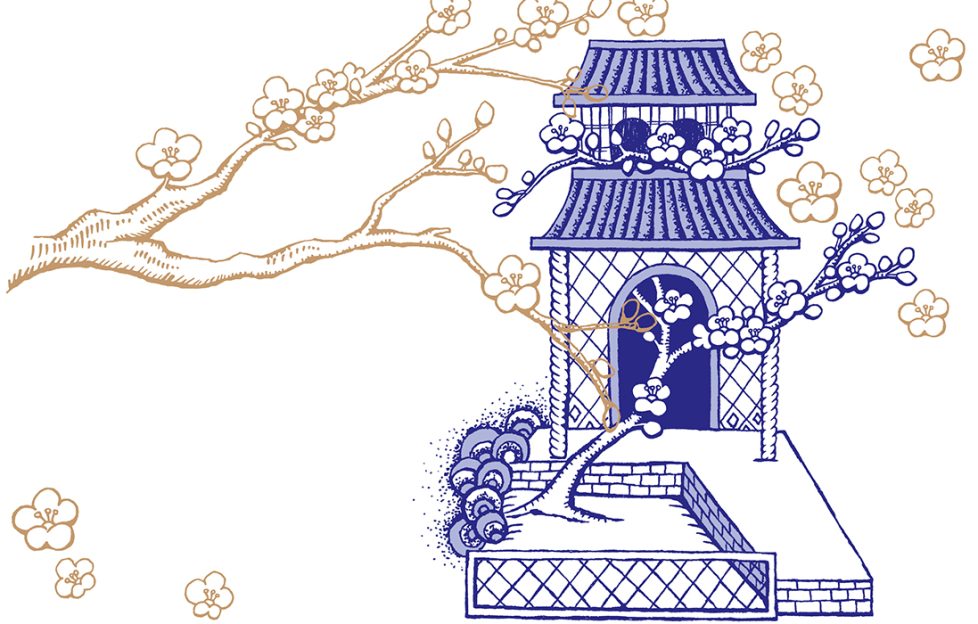Willow Patterned Plate

ROMANTIC SHORT STORY BY GAIL WARRICK COX
In this poignant, romantic short story, the willow patterned plate is more than just a family heirloom, it told a tale of forbidden love – and what could have been…
Granny Grace’s prized possession was her willow pattern plate. The familiar blue and white design adorned her anaglypta wall. It hung beside a misty mirror, above the shiny mantelpiece, home to an array of china creatures, their heads cocked as if listening for the chime of her pendulum clock.
Granny Grace had often recited the willow pattern rhyme to me when I was a child. It was a cryptic story that made little sense to me and yet her eyes would sometimes glaze when she told the tale, its meaning for her occasionally cracking her voice.
Two little birdies, flying high.
The first line of the rhyme.
“I’ll be a bird flying high one day,” she used to say. And I didn’t understand what she meant and Granny Grace never explained. It was a secret she kept.
Granny Grace had adored birds. Flocks of them would congregate in her garden, gratefully pecking at the endless supply of feed she would scatter on her wooden bird table. She was particularly fond of a stout white dove who visited her garden daily. She loved to see him there, remarked on how handsome he was with his snow-white feathers and beautiful fantail.
He’s there now, sitting on the fence, cooing and looking expectantly towards the kitchen window, waiting for seeds to be sprinkled on the bird table.
“I’ll go,” Mum says when she sees him perched there. And I think perhaps she just wants to go outside in the cool January air and gather her thoughts for a few minutes.
This must be tough for her. We’re clearing Granny Grace’s house. She and Mum were really close, it was just the two of them. Granny Grace brought Mum up on her own, an amazing feat in the days when having a child out of wedlock was a huge taboo. Granny Grace must have been so strong.
Mum bustles back into the kitchen, puts the bag of bird seed on the table.
She looks a little flustered.
“Let’s have a cuppa,” I say, flicking the kettle on.
“Good idea.” Mum pulls a chair out and plops into it.
As the kettle hums, I watch the dove on the bird table, his fantail bobbing rhythmically as he pecks at the generous helping of seed Mum has put out.
I pop a mug of tea in front of Mum and sit beside her. “Are you OK?” I ask.
We can stop for today if you like, come back tomorrow.
“I’ll be fine once I’ve had this tea,” she says, lifting her mug and forcing a smile.
Tea break over, we move into the lounge and start boxing up knick-knacks for the charity shop. I remove the willow pattern plate from the wall. “Not that,” Mum says, “I’m keeping that one.”
“Aw, Granny Grace would be really pleased,” I say. “She loved that plate.”
“He gave it to her,” Mum replies, holding her hand out for the plate.
“Who?” I ask, passing it to her.
“Jack,” Mum says, wistfully. She runs her finger around the edge of the plate.
“My father.”
I’m stunned. Mum had always told me she didn’t know who her father was.
All Granny Grace had said was that he was a kind man who had passed away before Mum was born.
“She told me the whole story a few months ago.”
Mum sinks into the sofa, her eyes glassy, the plate balanced on her lap.
It was the war. Granny Grace and Jack were in love, she was just seventeen and worked in a factory. Jack was twenty, a dashing RAF pilot. They met at a dance, she fibbed about her age, said she was twenty just like him. A romance developed while he trained at a nearby air base and they became inseparable.
“The relationship moved quickly as they so often did in those days, and before she knew it she had fallen pregnant. Jack was thrilled when she told him, said he’d marry her on his next leave. She was so happy and excited at the prospect of getting married to her handsome airman and starting a family.
“But his parents had other ideas, they were dead set against it. They implied she wasn’t the right class for their son and even accused her of trying to trap him. They forbade Jack from marrying her.”
“That’s so awful. What dreadful snobs.”
“It could be like that back then,” Mum says. “But Jack was undeterred. He hatched a plan, said they could marry the following year when they would both be twenty-one and wouldn’t need anyone’s permission.”
“Ah,” I say, realising that might be a problem for young Granny Grace. “So, what happened next? Did Granny Grace tell him she was only seventeen?”
“She did. And, apparently, he was furious. He was a very moral person. He couldn’t believe she’d lied to him. Said that a lie was no basis to start a marriage on, and even wondered if she had set out to trap him just as his parents had suggested. He broke it off with her. She was absolutely heartbroken.”
“Wow. Poor Granny Grace.”
“It wasn’t long before she began to show, and although her parents were a little surprised, they stood by her and looked after her throughout the pregnancy. Then, just before she was due, there was a knock at the door.
“It was Jack, and he asked to speak to her.
He told her he’d made a terrible mistake and that during the months they’d been apart she had been on his mind constantly. He still loved her and hoped she loved him, too.
“Said that if she still wanted to, and her parents were willing to give their consent, they could marry in a couple of months, when he would be twenty-one and able to make his own decisions.”
“So, he really did love her.”
“He did, and as a pledge of his love, he gave her the willow pattern plate.
“He told her its story and said it reminded him of their own.”
We both stare down at the plate on Mum’s lap. I’m slightly bewildered.
“So, what is the story of the willow pattern?” I ask.
“I could never make head nor tail of the rhyme Granny Grace used to recite.”
“Well, I believe there are a lot of variations,” Mum says, “but this is the story Jack told to Granny Grace.
“Long ago, the beautiful daughter of a Mandarin man fell in love with his lowly assistant.” Mum points to the building in the background of the plate.
“This is the man’s palace,” she says.
“The young couple want to get married, but the man forbids it. He feels the assistant is not of a high enough standing to marry his daughter, so instead he arranges for her to be betrothed to a nobleman.
“The new suitor comes to the palace in a boat laden with jewels.” Mum points to a little boat on the plate.
“While the nobleman and the man are celebrating the impending wedding, the young girl and her lover escape to an island far away, where they marry and live happily.”
“Just like Granny Grace and Jack,” I say, “except he’s the son of a high-standing family who disapprove of the marriage, and she’s a lowly factory girl.”
“Exactly, it was such a poignant thing to give to her.”
So, why didn’t they get married?
“Jack got sent on an important mission and, very sadly, he never made it back. The willow pattern plate was the only memento Granny Grace had of him.
“His parents wouldn’t even allow her to attend his memorial service.”
“That’s terrible. Poor Granny Grace.”
“Yes. And she kept the story to herself for all these years. It was just too painful for her to recount. She pushed it to the back of her mind and concentrated on bringing me up. It was very difficult for a single mother in those days.”
“And she didn’t ever find anyone else to love?” I ask.
“No. There were one or two boyfriends, but nothing serious. We were happy together, just the two of us. She was a great mum.”
We stare at the willow pattern plate, the royal blue transfer still crisp against the white background. The scene beginning to make a more sense to me.
“There’s a plainer building in the background.” I point it out on the plate.
“Is this where the young couple ran away to?”
“I expect so,” Mum says. “If only Granny Grace and Jack could have lived happily together, at least for a while.”
Mum looks tired.
“I’ll fetch something to put the plate in,” I say. “Then I think we’ll leave this for today. We can come back tomorrow when we both feel a little fresher.”
I rummage around under the stairs and emerge with some bubble wrap.
“This will keep it safe in the car.”
Mum hands me the plate. I spot the two birds flying over the scene and remember the first line of the rhyme.
Two little birdies flying high.
“What’s the significance of the birds?” I ask.
“There’s a bit more to the story,” Mum says. “After the couple eloped, the Mandarin man’s assistant became a famous writer. Word of his fame reached the man who sent his men to track the couple down.
“Unfortunately, there was a mix-up and the young couple lost their lives at the hands of the Mandarin man’s men.”
“That’s such a sad story,” I say.
“It is,” Mum agrees. “But it’s still not quite the end of the tale.”
“How’s that?” I ask.
Apparently, the Gods took pity on the young couple and immortalised them as a pair of doves: the two birds you can see at the top of the willow pattern scene.
I look at the plate, the doves flying high together, the tips of their beaks almost touching. Mum wipes a little tear away from her eye.
“Come on,” I say. “Let’s lock up and go home.” I pull the bubble wrap around the plate, hand it back to Mum and we head into the kitchen.
As I lock the back door, Mum peers out of the window over the sink. The stout white dove is still on the bird table, pecking away at the seeds.
Beside him is a smaller, daintier dove, her tail not quite so elaborate.
For a moment they stop feeding and snuggle together at the edge of the table.
Then, in an explosion of beating wings and flashing white feathers they soar into the air, circle the garden and disappear over the rooftops.
“Two little birdies flying high,” I say as they disappear into the distance.
Mum clutches the willow pattern plate close to her heart.
“Granny Grace and Jack, reunited forever…” she sighs.




